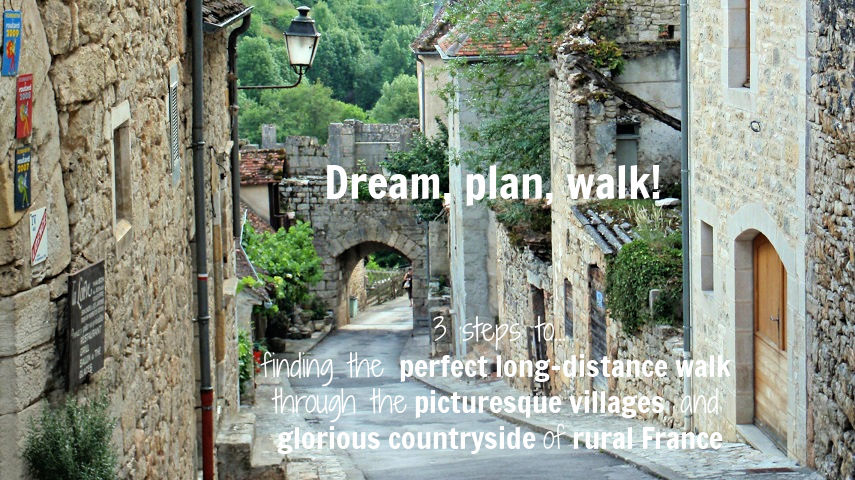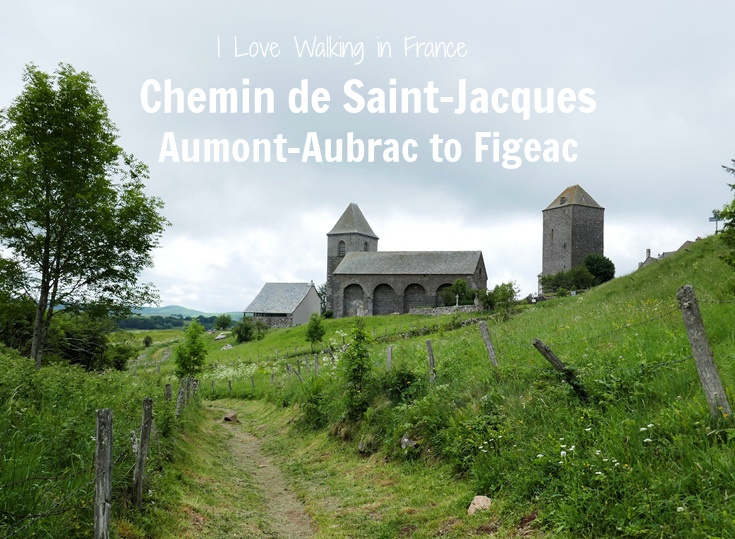
(Published June 2013, last updated May 2025)
The 163-kilometre (102-mile) section of the Chemin de Saint-Jacques from Aumont-Aubrac to Figeac is perhaps my favourite, featuring many highlights and special moments along the way.
This section of the Chemin de Saint-Jacques du-Puy—which passes through Saint-Côme-d’Olt, Estaing and Conques (three of France’s most beautiful villages) and the tiny, historic village of Aubrac—was my introduction to long-distance walking and was such a memorable experience that I’ve returned many times.
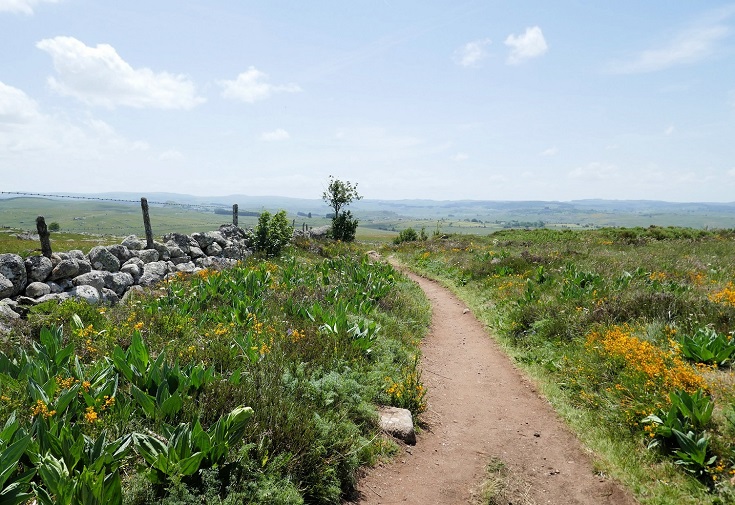
The Aubrac plains, somewhere between Finieyrols and Montgros (photo taken in early June)
Look inside the CHEMIN DE SAINT-JACQUES DU-PUY (PDF) guidebook
Where is the Chemin de Saint-Jacques in France?
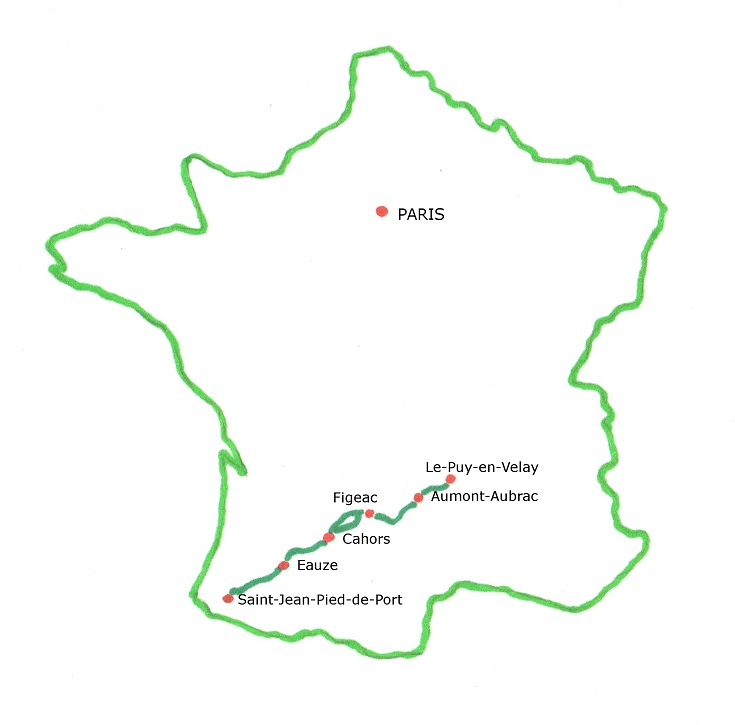
Map of the Chemin de Saint-Jacques from Aumont-Aubrac to Figeac
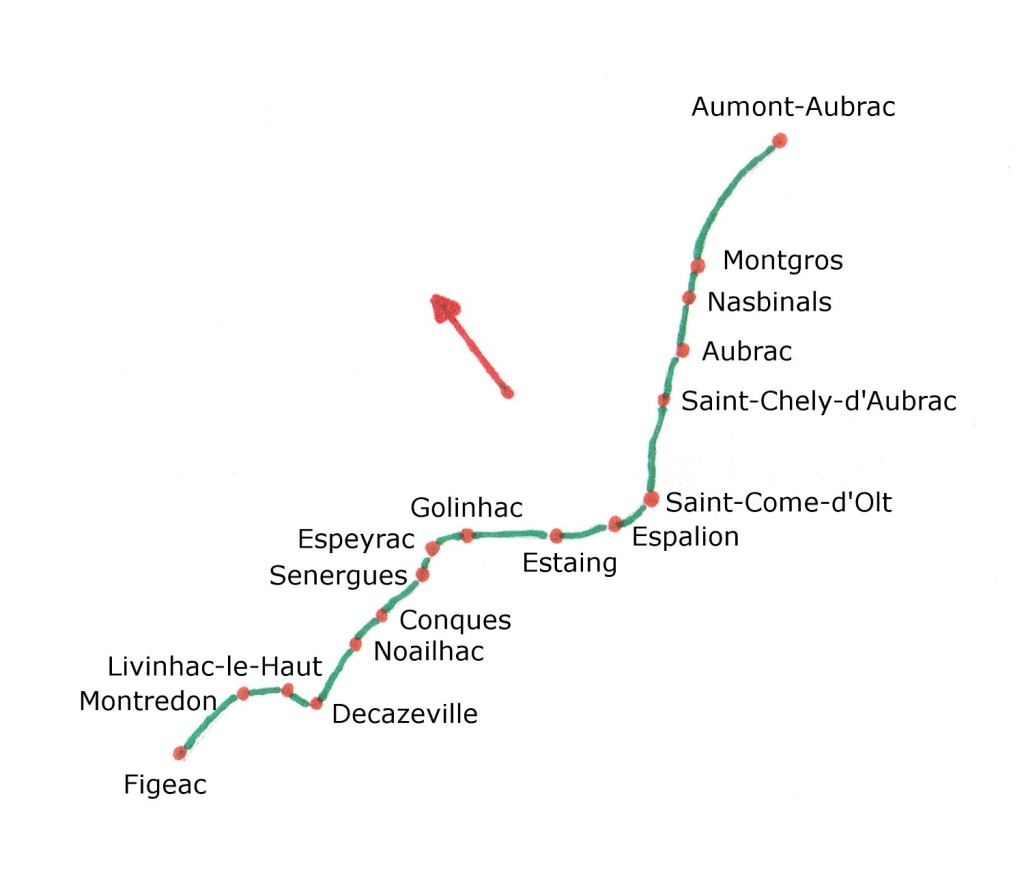
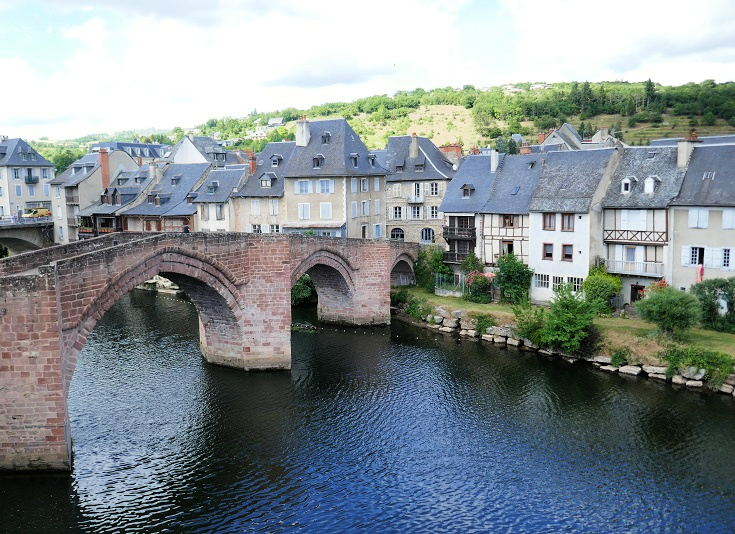
The view from my window at Gîte le Pont-Vieux, Espalion
Accommodation from Aumont-Aubrac to Figeac
Accommodation on, or very close to the path is available in the following towns.
Distances are given from the starting point of Le Puy-en-Velay.
88.5 km (55.3 mi) Aumont-Aubrac
93 km (58.1 mi) La Chaze-de-Peyre
95 km (59.4 mi) Lasbros
99 km (61.9 mi) Les Quatre Chemins
104.5 km (65.3 mi) Finieyrols
110.5 km (69.1 mi) La Grange des Enfants (400m from the path)
112 km (70 mi) Montgros
115 km (71.9 mi) Nasbinals
124 km (77.5 mi) Aubrac
131.5 km (82.2 mi) Saint-Chély-d’Aubrac
138.5 km (86.6 mi) Lestrade
148 km (92.5 mi) Saint-Côme-d’Olt
156 km (97.5 mi) Espalion
159 km (99.4 mi) Bessuéjouls
165 km (103.1 mi) Verrieres
168 km (105 mi) Estaing
176 km (110 mi) Fonteilles (150m from the path)
180.5 km (112.8 mi) Massip
182.5 km (114.1 mi) Golinhac
187.5 km (117.2 mi) Campagnac
191 km (119.4 mi) Espeyrac
194.5 km (121.6 mi) Sénergues
203.5 km (127.2 mi) Conques
210.5 km (131.6 mi) Noailhac
222 km (138.8 mi) Decazeville
226 km (141.3 mi) Livinhac-le-Haut
232 km (145 mi) Montredon
235.5 km (147.2 mi) Lacoste
239 km (149.4 mi) Terly
243.5 km (152.2 mi) Saint-Jean-Mirabel
251.5 km (157.2 mi) Figeac
How to book accommodation in French
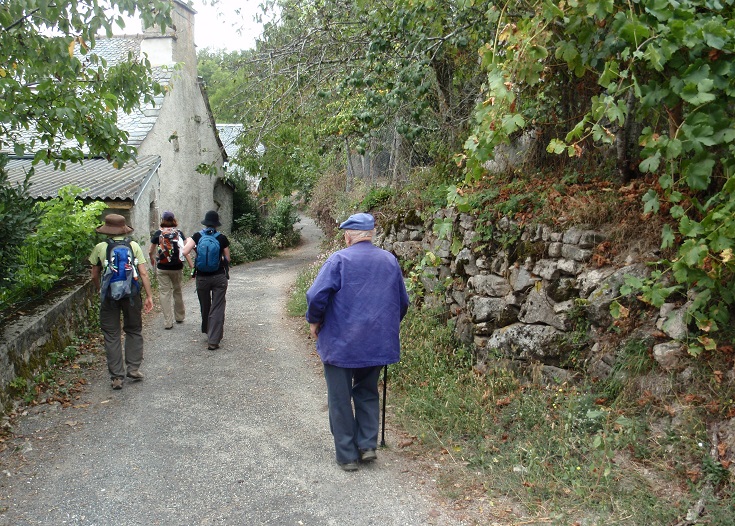
Receiving an escort through the village of Campagnac
Itineraries for Aumont-Aubrac to Figeac
As you plan your walk, remember that there are no set stages and you are free to walk as far or as little each day as you wish. Guidebooks (mine included) are often organised around a list of villages or towns but there is no advantage or obligation to follow these suggestions if the distances do not suit you.
If your preference, or an injury, dictates that no more than ten kilometres (six miles) each day is best for you, listen to your intuition and plan accordingly. On the other hand, if you know you can comfortably walk 25 or more kilometres (15 miles) each day, plan a more strenuous schedule that meets your needs.
My nine-day itinerary allows time for a couple of free afternoons to explore the ‘most beautiful villages’ of Estaing and Conques. Both villages are impossibly gorgeous and even if you do nothing more than find a shady table in a café and put your feet up for the afternoon, these two slower days will provide a welcome chance to restore your energy.
When I did this walk again in 2022, I allowed myself the luxury of several spare hours to explore Espalion and discovered a town filled with hidden delights and stunningly beautiful buildings.
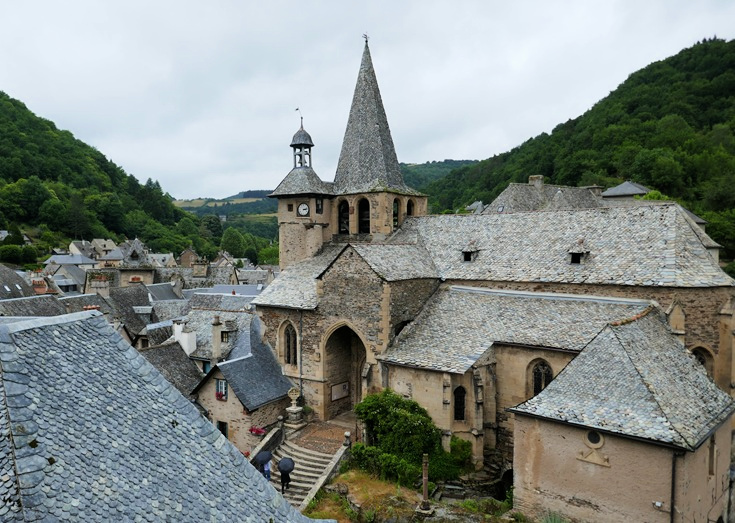
Église Saint-Fleuret, viewed from Château d’Estaing
Nine-day itinerary for Aumont-Aubrac to Figeac
Day 1 Aumont-Aubrac to Montgros (23.5 km/14.7 mi)
Day 2 Montgros to Aubrac (12 km/7.5 mi)
Day 3 Aubrac to Saint-Côme-d’Olt (24 km/15 mi)
Day 4 Saint-Côme-d’Olt to Espalion (8 km/5 mi)
Day 5 Espalion to Estaing (12 km/7.5 mi)
Day 6 Estaing to Espeyrac (24.5 km/15.3 mi)
Day 7 Espeyrac to Conques (12.5 km/7.8 mi)
Day 8 Conques to Livinhac-le-Haut (22.5 km/14.1 mi)
Day 9 Livinhac-le-Haut to Figeac (25.5 km/15.9 mi)
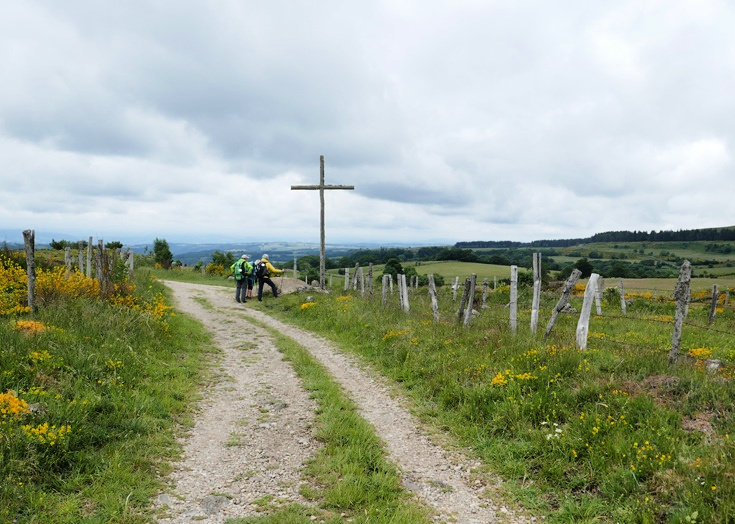
A group of walkers take a short break beside a cross (between Aubrac and Saint-Chély-d’Aubrac)
Many walkers, especially those who have started in Le Puy-en-Velay and are settling into a rhythm of 20—25 kilometres (12—15 miles) each day, complete this section of the Chemin de Saint-Jacques in seven days. But this is a breath-takingly beautiful part of the world, filled with glorious landscapes and gorgeous villages—and it would be a shame to rush through!
Eight-day itinerary for Aumont-Aubrac to Figeac
Day 1 Aumont-Aubrac to Montgros (23.5 km/14.7 mi)
Day 2 Montgros to Saint-Chély-d’Aubrac (19.5 km/12.2 mi)
Day 3 Saint-Chély-d’Aubrac to Espalion (24.5 km/15.3 mi)
Day 4 Espalion to Estaing (12 km/7.5 mi)
Day 5 Estaing to Espeyrac (23 km/14.4 mi)
Day 6 Espeyrac to Conques (12.5 km/7.8 mi)
Day 7 Conques to Livinhac-le-Haut (22.5 km/14.1 mi)
Day 8 Livinhac-le-Haut to Figeac (25.5 km/15.9 mi)
Look inside the CHEMIN DE SAINT-JACQUES DU-PUY (PDF) guidebook
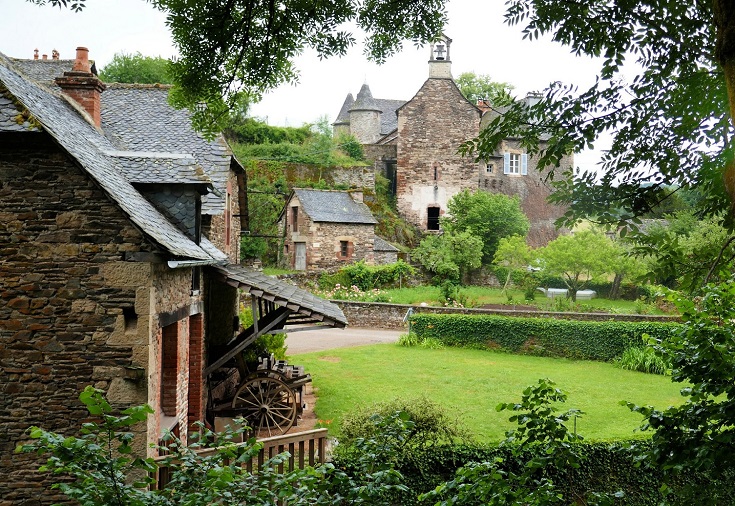
The picturesque village of Verrières
The best time of year to walk from Aumont-Aubrac to Figeac
Although most of the small hotels along this section are open throughout the year, many of the chambres d’hôtes and gîtes close from mid to late October, taking a well-earned break before reopening in late March or around Easter.
Weather conditions are similar to the previous section from Le Puy-en-Velay to Aumont-Aubrac with winter bringing snow to the higher elevations; conditions which, in some years, extend into early May. At these times walking can be challenging, particularly on the Aubrac Plains between Les Quatre Chemins and the village of Aubrac. With fewer trees, trail markings are often on rocks and generally close to the ground; the path and the markings may not be visible under a good dusting of snow.
My advice is to make safety a priority and take any advice offered by accommodation hosts who will have a good idea of more dangerous parts of the path and possible ways to avoid them.
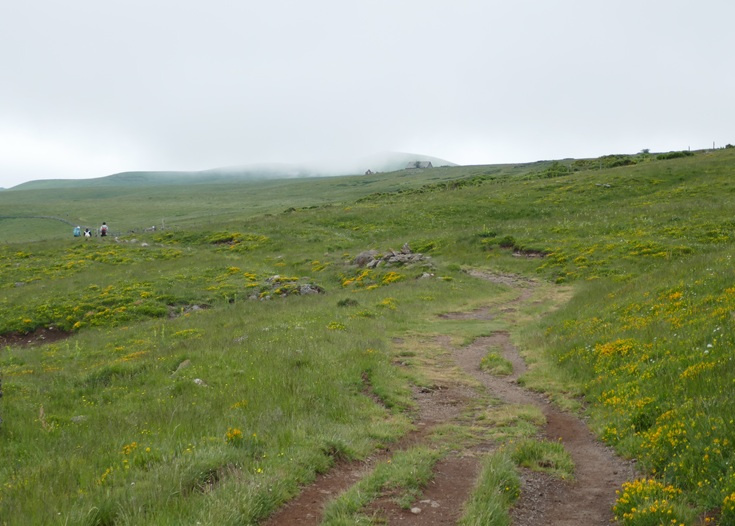
Fog and snow can threaten visibility on the Aubrac Plain, covering the ground and making the trail and the markings almost impossible to find.
Soon after the snow clears and spring arrives, the pastures are covered in jonquils and daffodils (and capturing this is a high priority for my next visit!) and by early June the path is flanked with masses of wildflowers!
Summer temperatures can be quite high with the occasional 40-degree (Celsius) heatwave. In these conditions, carrying plenty of water and refilling your water bottle whenever you have the chance becomes a high priority. But July and August is also the time of year when you’ll find everything—such as the Diving Museum and Château Fort de Calmont-d’Olt in Espalion—open.
In September, temperatures drop and the milder weather is perfect for walking. Although most of the wildflowers have disappeared, you will find a smattering of autumn colours punctuating the fields.
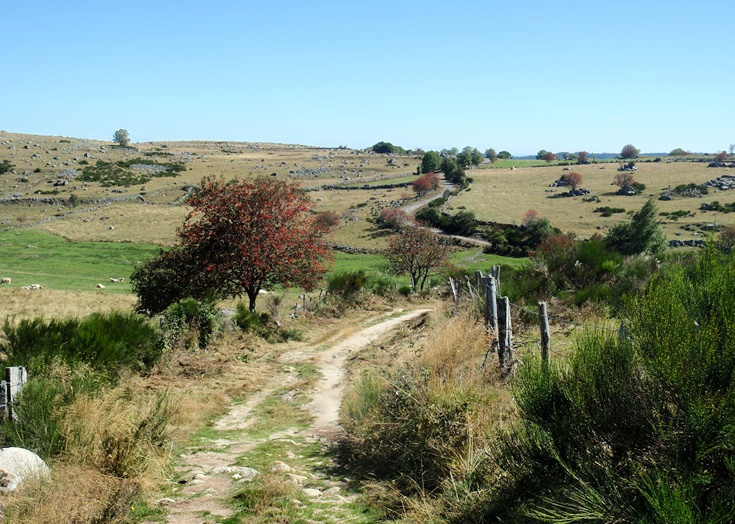
Splashes of autumn colour brighten the path between Finieyrols and Montgros
Do I need to pre-book accommodation?
When it comes to pre-booking accommodation, most walkers fall squarely into one of two camps—those who always do, and those who can’t imagine why locking in your overnight stops in advance would be a good idea. When walking, I definitely fall into the first group, but many walkers set out each morning with little more than a vague plan and successfully find a bed each night. The more flexible you are with types of accommodation (the occasional more expensive hotel or more basic bunk bed dormitory) and distances walked (perhaps a longer or shorter day than you would prefer), the better your chances of finding a bed.
If you started your walk in Le Puy-en-Velay, you’ll have a good feel by now for how busy the path is and whether you need to book several days ahead or can wait until the morning before. If there is a particular village, hotel, chambre d’hôte or gîte that you’d like to stay at, I always recommend booking a bed as early as possible.
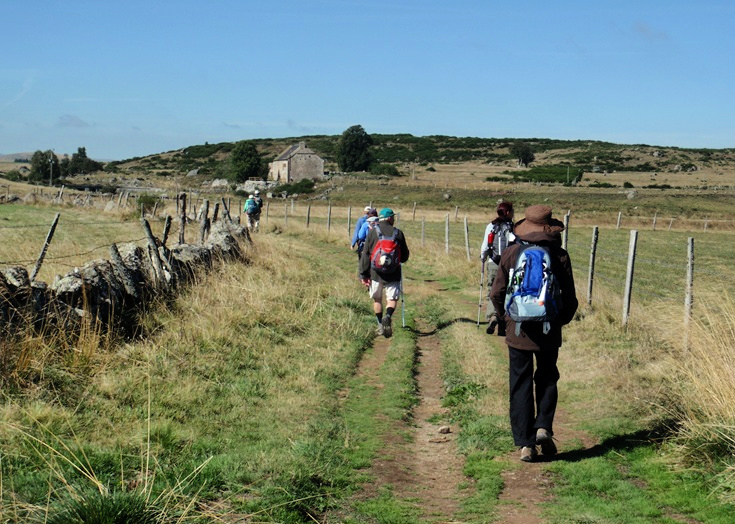
There is no shortage of company on the Chemin de Saint-Jacques between Lasbros and Montgros
In May and early June, many French walkers take advantage of a string of public holidays to make their vacation leave go further and head out for a week-long walk. In 2025, these days fall on 1 May (Labour Day), 8 May (Victory in Europe Day), 29 May (Ascension Day) and 9 June (Whit Monday) and accommodation can be tight during these weeks.
On the Sunday closest to 25 May, the Transhumance—the annual migration of cattle to summer pastures—begins. Cattle are decorated with flowers and flags and paraded through Place de la Fontaine in the village of Aubrac before setting out for higher ground. The departure of each of the participating farms is staggered throughout the day, and roughly ninety minutes later, the arrival of each herd is celebrated in nearby Fontanilles. The Transhumance is a major event on the Aubrac calendar and rooms are booked many months, sometimes a year, in advance—be prepared to detour well off the path if you don’t have a bed secured.
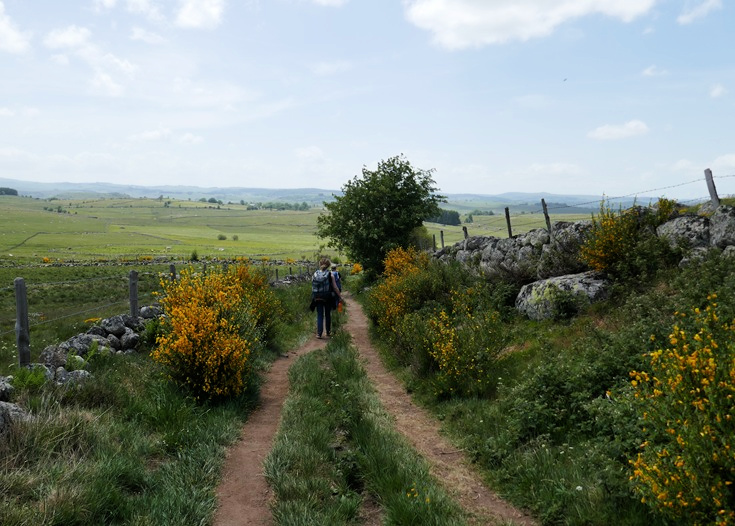
A glorious day for walking, between Aubrac and Saint-Chély-d’Aubrac
Mid-June through until late August is usually a quieter period and there is less demand for accommodation. Then, when school holidays finish in early September, many French grandparents are relieved of baby-sitting duties and once again, the chemin sees an increase in the number of older walkers seeking beds for the night.
If you enjoy participating in the communal dinner each night, booking your room and dinner the day before gives your host time to prepare and is a courtesy that is always appreciated. And if you have any special dietary considerations, a few days’ notice may be the difference between a delightful meal and settling for trail mix.
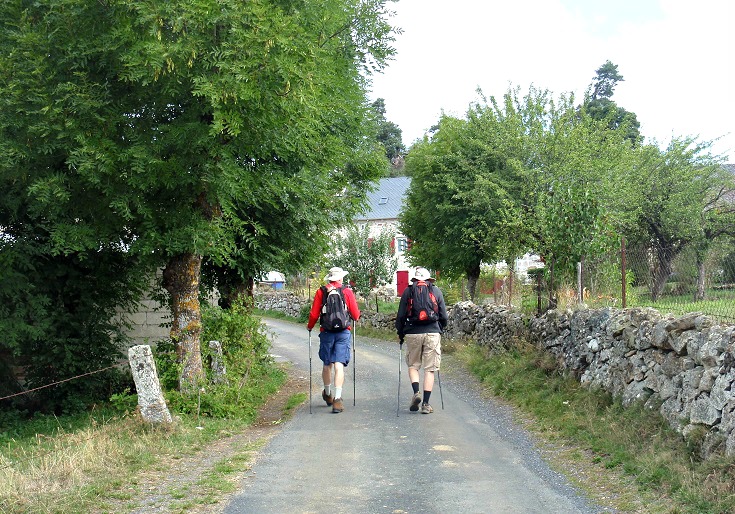
Two walkers (approaching La Chaze-de-Peyre) who have chosen to have their luggage transferred each day, allowing them to travel lightly. (I met up with these two men several times over the next few days—brothers who now lived in different parts of Europe but reunited each year to walk together for one week.)
Luggage transfers
The Chemin de Saint-Jacques du-Puy is blessed with several companies who will transport your luggage on to your next destination. Make sure your bags meet all weight and size requirements, are clearly labelled and are in the foyer by 8am each morning. Your bag will be delivered to your accommodation (according to your booking instructions) later that day.
Be aware that transfer companies generally do not collect and deliver to accommodation that does not provide a secure place to leave luggage. If you book accommodation through a hotel booking website that provides access remotely via a code, you may need to make arrangements to have your bags delivered elsewhere.
Each of these companies has slightly different prices, weight limitations, and start and end of season dates. Check each one for the service that suits you best.
La Malle Postale (Le Puy-en-Velay to Aire-sur-l’Adour)
Transport du Levant (Le Puy-en-Velay to Figeac)
Transport Lample (Le Puy-en-Velay to Moissac)
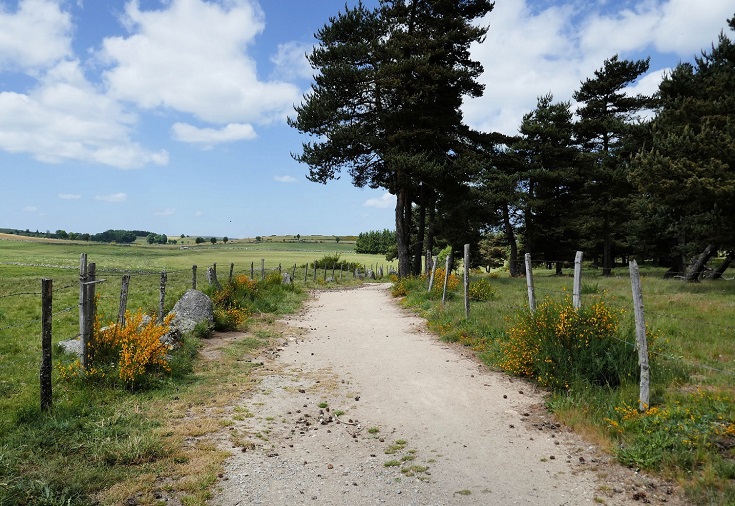
The start of the Aubrac plains between Les Quatre Chemins and Finieyrols
Transport options to and from Aumont-Aubrac
Train line Béziers—Millau—Clermont-Ferrand connects Aumont-Aubrac to Clermont-Ferrand, Millau and Béziers.
Lozère bus line 283 connects Aumont-Aubrac to Clermont-Ferrand, Saint-Chély-d’Apchier, Marvejols and Mende.
Clermont-Ferrand has daily train connections from Paris.
Transport options along the Chemin de Saint-Jacues
The first 200 kilometres (125 miles) of the Chemin de Saint-Jacques is well supported by the Compostel’Bus which runs between Le Puy-en-Velay and Conques each morning and makes the return journey each afternoon. Seats fill fast in very hot or rainy weather and I recommend booking a seat as early as possible.
On this section, the bus stops at Aumont-Aubrac, Les Quatre Chemins, Nasbinals, Aubrac, Saint-Chély-d’Aubrac, Saint-Côme-d’Olt, Espalion, Estaing, Golinhac, Espeyrac, Sénergues and Conques.
On the first stage of this walk from Le Puy-en-Velay to Aumont-Aubrac, stops include Le Puy-en-Velay, Montbonnet, Saint-Privat-d’Allier, Monistrol-d’Allier, Saugues, Villeret-d’Apchier, Chanaleilles, La Chapelle-Saint-Roch (3 kms beyond le Sauvage), La Roche, Les Faux and Saint-Alban-sur-Limagnole.
Transport options to and from Conques
Many people finish a walk along the Chemin de Saint-Jacques in Conques, sometimes returning in later years to continue the journey. Although public transport options can be more complicated, there are several ways out of the village.
The Compostel’Bus will return you to Le Puy-en-Velay or any of the other villages along the way.
Aveyron bus line 223 runs and connects Conques to Saint-Christophe Vallon, Marcillac-Vallon and Rodez which all offer bus or train services to other towns.
La Malle Postale and Transport Lample offer passenger transfers in addition to luggage transfers. Check that the direction of travel suits you and book a seat as early as possible.
Transport options to and from Figeac
Train line Aurillac—Figeac—Toulouse connects Figeac to Aurillac and Toulouse (and several other towns) which both have daily train connections to Paris.
Train line Rodez—Figeac—Brive connects Figeac to Decazeville (on the GR65 path), to Brive-la-Gaillarde and Rodez for train connections to Paris, and to Rocamadour—a magnificent medieval city which makes a perfect day trip from Figeac.
Lot bus line 889 Figeac—Cahors connects Figeac with several other villages along the next stage of the Chemin de Saint-Jacques including Faycelles, Cajarc, Tour-de-Faure (Saint-Cirq-Lapopie), Bouziès, Vers and Cahors.
Lot bus line 876 Figeac—Rocamadour—Padirac connects Figeac with Gramat, Rocamadour and Padirac.
Find many more practical tips on preparation, packing, choosing a guidebook and avoiding blisters.
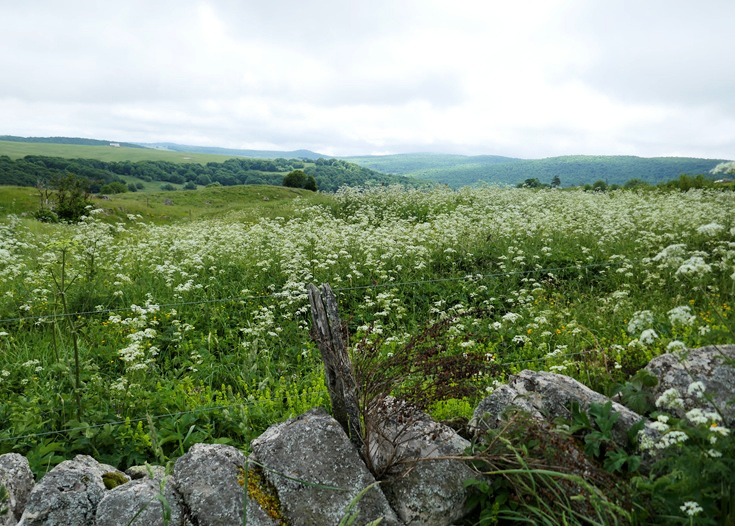
Wildflowers crowd out the grasses in a field near the village of Aubrac
Look inside the CHEMIN DE SAINT-JACQUES DU-PUY (PDF) guidebook
HIGHLIGHTS OF STAGE 2: AUMONT-AUBRAC TO FIGEAC
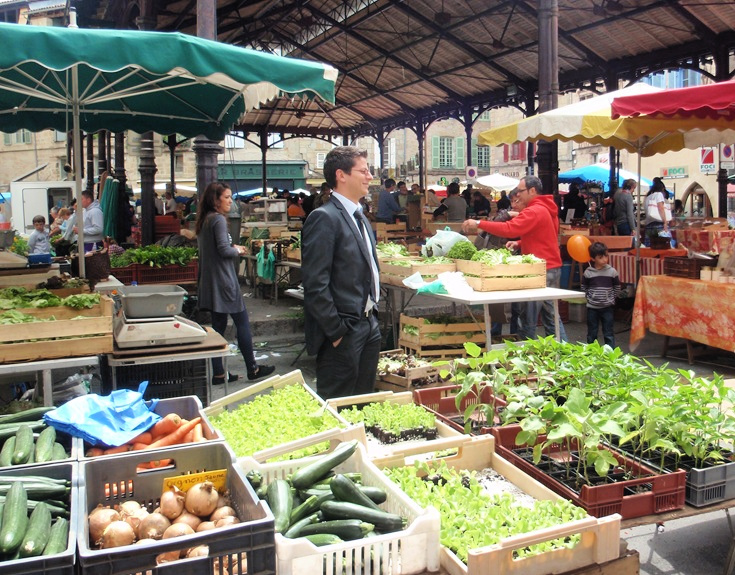
Saturday morning market in Figeac
Fresh food markets
Several villages along the way host a fresh food market once or twice a week providing the perfect opportunity to pack restock your trail mix supplies or pack a picnic lunch.
Aumont-Aubrac—Friday morning
Saint-Chély-d’Aubrac—Wednesday morning all year, Thursday evening in summer
Saint-Côme-d’Olt—Sunday morning all year, Sunday evening from mid-July until mid-August
Espalion—Friday morning all year, Wednesday evening in July and August
Estaing—Friday evening in July and August
Conques—Thursday evening in late July and August
Decazeville—Tuesday and Friday mornings
Figeac—Saturday morning
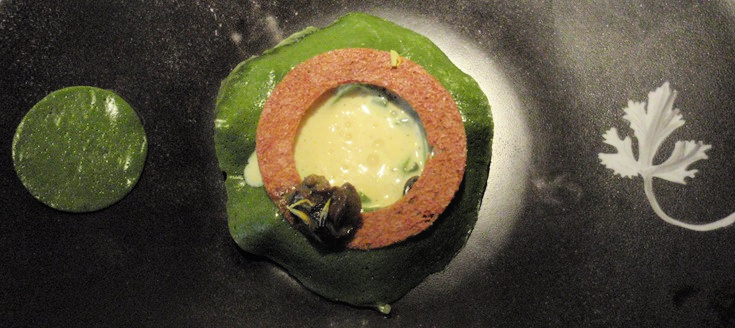
One course of a sumptuous meal at Cyril Attrazic
Dine at a Michelin-starred reataurant in Aumont-Aubrac
Before starting your walk, treat yourself to dinner at the Michelin-starred restaurant, Cyril Attrazic, attached to Hôtel Chez Camillou in Aumont-Aubrac. Since I last ate here, the restaurant has earned a second star and prices have risen accordingly. As you will no doubt realise after a few days of walking, food throughout France is exceptionally good, whether it’s served in a gîte or a five-star hotel, but a meal here at Cyril Attrazic will set the bar high for the rest of your visit. (Check the website for the full menu and opening hours.)
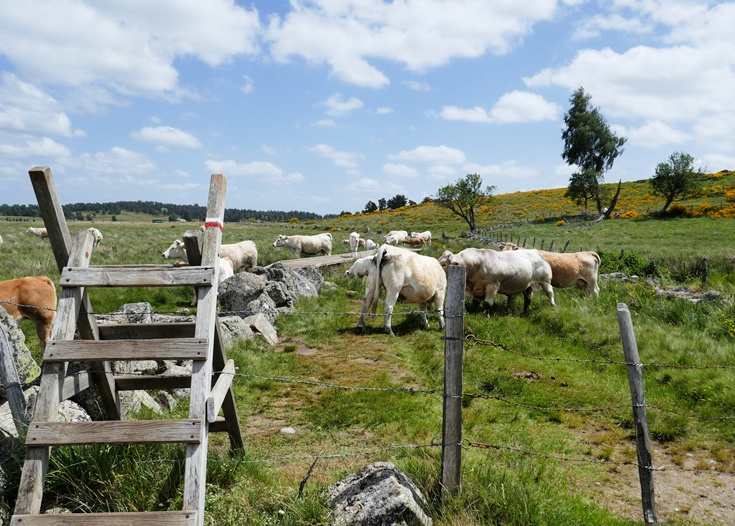
Cattle graze on the Aubrac Plains
Aubrac—the plains
Not far beyond the intersection at Les Quatre Chemins, the remnants of the forest fade away revealing the wide-open spaces of the Aubrac Plains. For the next thirty-odd kilometres (twenty miles), you’ll wander over vast, gently rolling hills, punctuated by babbling streams and the occasional herd of cows. On a sunny day with the breeze in my hair and the ground covered in summer wildflowers, there is nowhere I would rather be! (If cows are not your thing, there is an alternative path for walkers with dogs or other animals which avoids the cows.)
When I feel I’m getting too old to walk, this is where I’ll return—basing myself in the village of Aubrac and roaming the countryside each day.
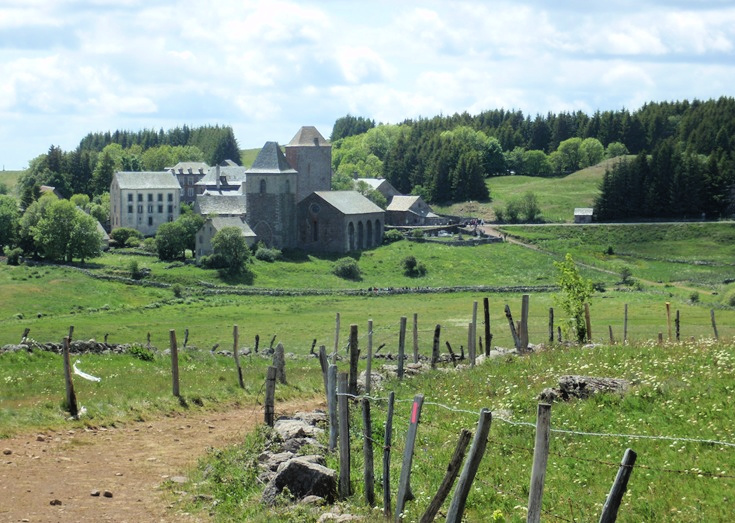
Approaching the village of Aubrac
Aubrac—the village
There’s something about the cluster of ancient stone houses nestled in a dip of the rolling green hills that always has me longing to strap on my boots and get walking again. I can still taste the French onion soup we enjoyed for lunch in Chez Germain and see the mouth-watering array of tarts laid out for dessert.
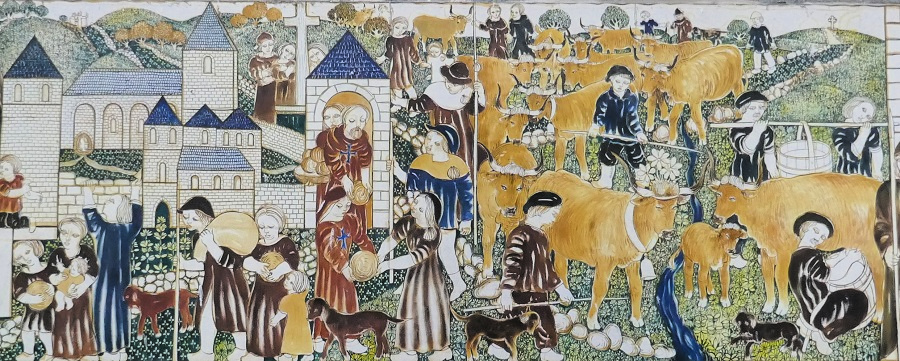
Murals decorating the walls of the church tell the story of the twelfth-century pilgrim, Adalard
The picturesque village of Aubrac was built in the twelfth century by the pilgrim Adalard, who had been attacked by bandits when he passed through in 1120. He returned and built a monastery, church and hospital where up to 500 pilgrims could be fed and cared for each night. Many of the medieval buildings have long disappeared, but those that remain offer a glimpse into a world from centuries past.
Take a closer look around Aubrac and find a comprehensive list of accommodation and transport options.
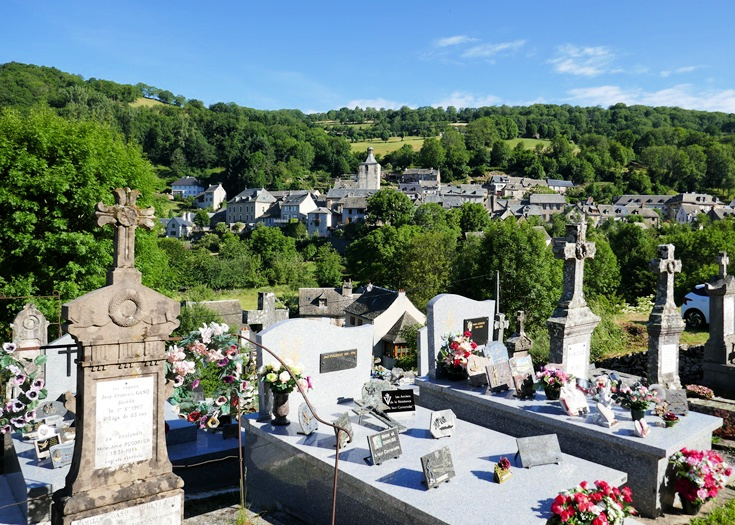
View of Saint-Chély-d’Aubrac from the cemetery on the path out of town
Saint-Chély-d’Aubrac
On the third day after leaving Aumont-Aubrac, you’ll pass through Saint-Chély-d’Aubrac—a quintessential rural French village, boasting a school, a café and several options for an overnight stay if you are following my shorter eight-day itinerary. Although it feels quite modern after the medieval charm of Aubrac, the church dates from the fourteenth century and the turrets and towers are a reminder that village life has been going on here for many centuries.
Take a closer look around Saint-Chély-d’Aubrac and find a comprehensive list of accommodation and transport options.
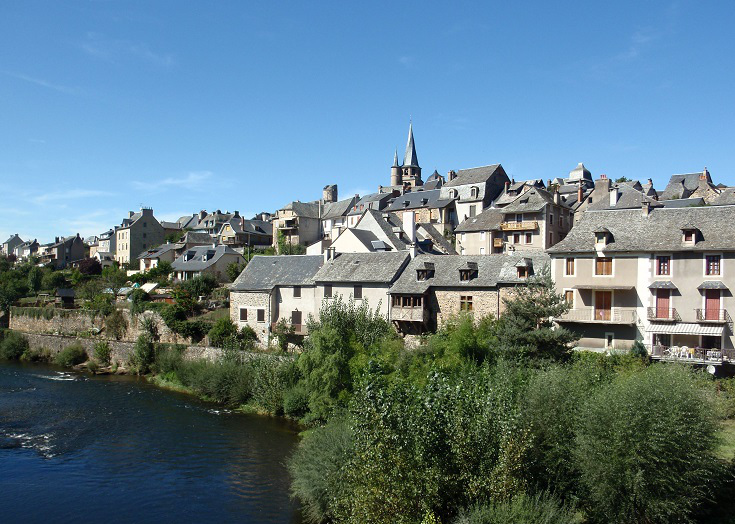
The twisted spire of Église de Saint-Côme and Saint-Damian rises above the skyline of Saint-Côme-d’Olt
Saint-Côme-d’Olt
Between Le Puy-en-Velay and Saint-Jean-Pied-de-Port, the Chemin de Saint-Jacques passes through eleven of France’s ‘most beautiful villages’. (To qualify as one of France’s most beautiful villages, or plus beaux villages, a strict set of criteria must be met. This includes a rural setting, a population of less than two thousand and at least two historical monuments or sites that the town commits to protecting and preserving.)
The first of the ‘most beautiful villages’ is Saint-Côme-d’Olt, dotted with interesting historical monuments which are mostly located a block or two from the GR 65 path. Ask for a map at the Tourist Office so you don’t miss any! As you follow the map, you’ll visit the twelfth-century Chapelle des Pénitents, l’Oradou—a small monument honouring victims of the 1586 plague that claimed the lives of three-quarters of the population, and pass through the old gates which guarded entrance to the town.
(If you are following my nine-day itinerary, tomorrow is a short eight-kilometre (five mile) walk to Espalion which allows time to explore Saint-Côme-d’Olt before leaving town in the morning.)
Take a closer look around Saint-Côme-d’Olt and find a comprehensive list of accommodation.
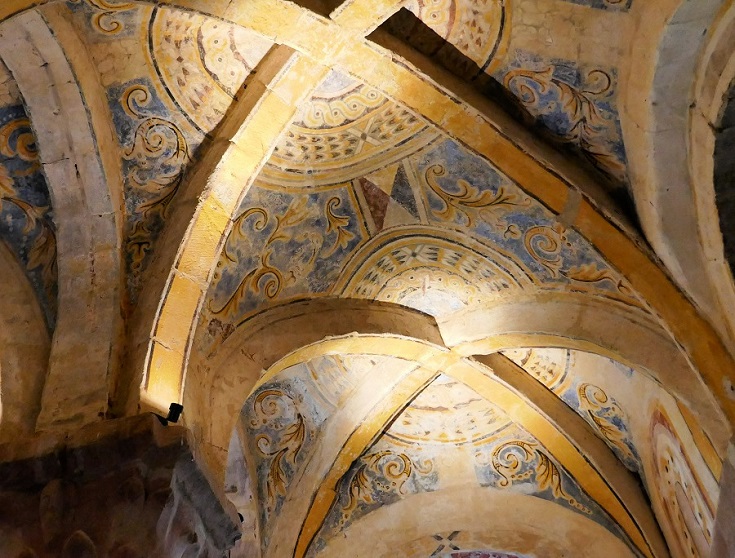
Richly decorated ceiling of Église de Perse
Église de Perse
Between Saint-Côme-d’Olt and Espalion, the GR 65 path is quite hilly. These inclines can be avoided by following an unmarked path which more or less follows the southern bank of the River Lot. No matter which path you choose to take, they meet again shortly before reaching Espalion near Église de Perse.
This beautiful church was built during the eleventh and twelfth centuries and holds the relics of a local saint, Hilarian, who was decapitated by the Sarrazins in the eighth century. Inside you’ll find beautifully decorated ceilings and walls of deep red stone.
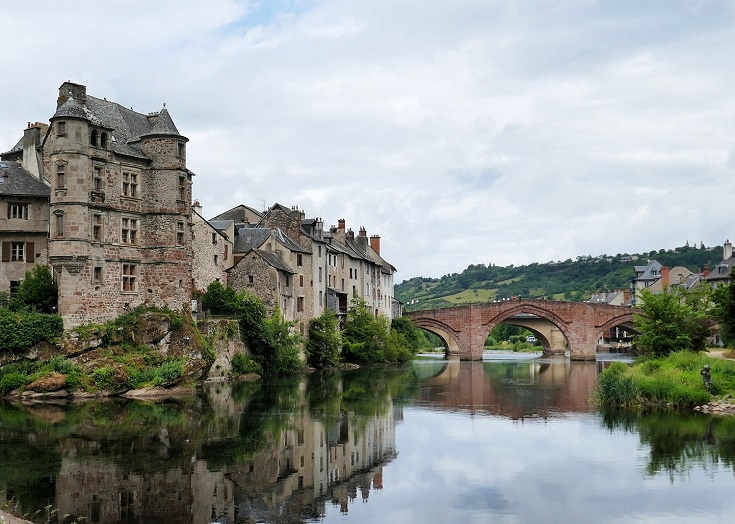
Vieux Palais, Espalion
Espalion
Spend an hour or two wandering the streets of this beautiful town with its fairy-tale turrets, medieval bridge and ancient tanneries lining the river. If you are following my suggested itinerary, you’ll arrive in Espalion four days after leaving Aumont-Aubrac, with the afternoon free and plenty of time to wander the streets, visit the museum honouring Auguste Denayrouze and Benoît Rouquayrol who lived nearby and invented the first modern diving equipment, and admire the richly decorated baroque interior of Chapelle des Pénitents.
Take a closer look around Espalion and find a comprehensive list of accommodation and transport options.
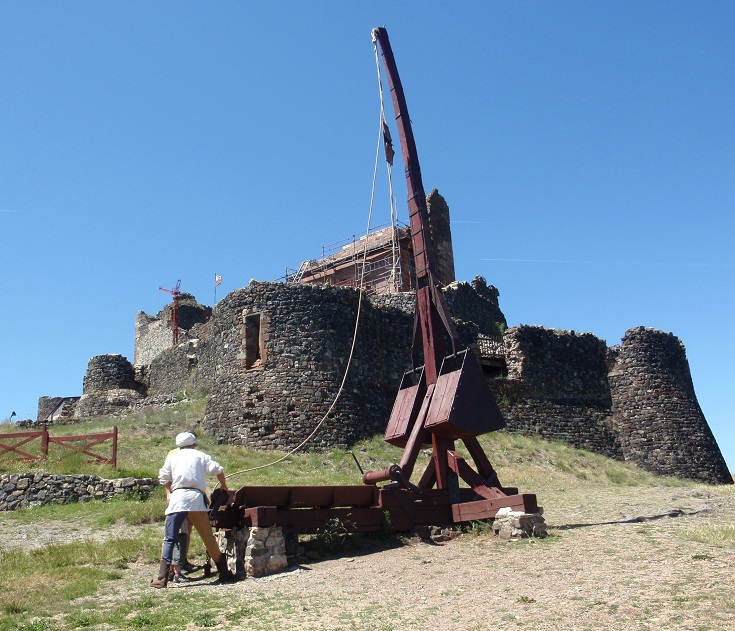
Catapult demonstration at Château Fort de Calmont d’Olt
Château Fort de Calmont d’Olt
Perched on a hill overlooking Espalion is Château Fort de Calmont d’Olt—a fortified castle dating from the Middle Ages. Guided tours are available or you can explore on your own.
I’ll admit a visit to the château required climbing one hill too many as I walked the Chemin de Saint-Jacques but I had visited the previous year. If you’d like to see it, take a taxi up the hill from Espalion and continue your walk from the château (or perhaps ask the driver to return in an hour or two and take you on to Bessuéjouls).
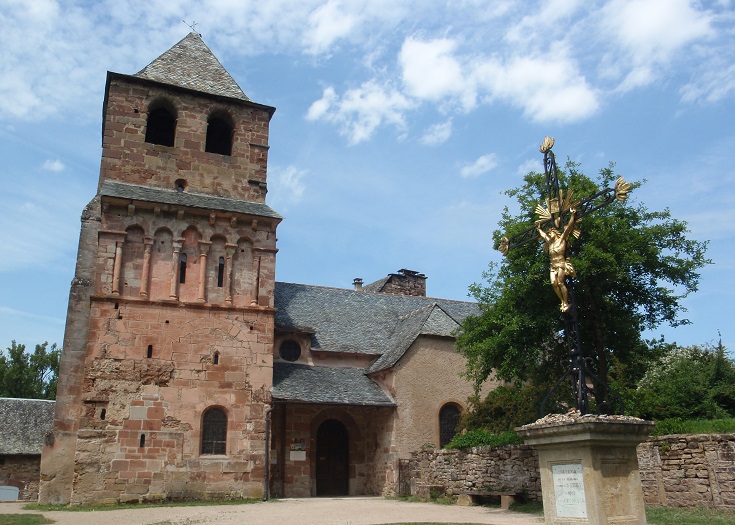
L’église Saint-Pierre in Bessuéjouls
Église Saint-Pierre in Bessuéjouls
Venture inside Église Saint-Pierre in the hamlet of Bessuéjouls. Although the church was renovated in the sixteenth century, the adjoining twelfth-century bell tower was left intact. Stairs at the rear of the church will take you up to the ancient chapel honouring Saint-Michel. The views are lovely but the history oozing from the stone walls is almost palpable.
Take a closer look inside Église Saint-Pierre and find a comprehensive list of accommodation nearby.
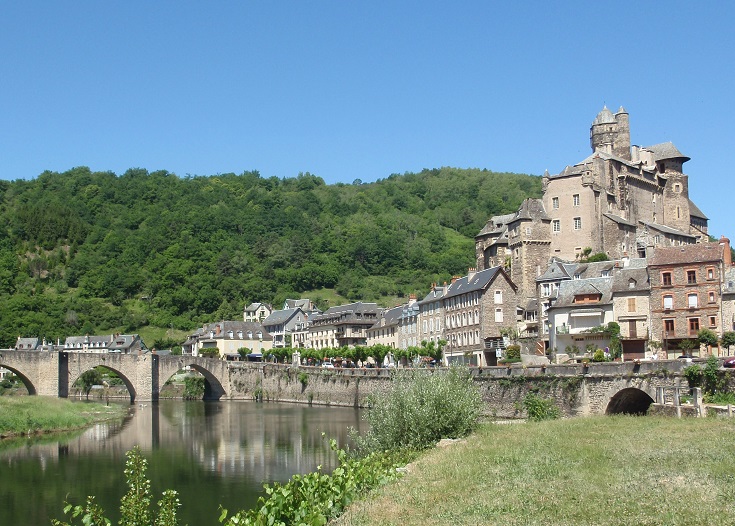
Château d’Estaing dominates the village of Estaing
Estaing
A short (12 km/7.5 mi) walk from Espalion will bring you to the second ‘most beautiful village’ of Estaing in time for lunch. Located on the far side of the river from the GR 65 path and dominated by an imposing eleventh-century château, the village begs to be explored. (Many organised walking companies pass by Estaing on a 35-kilometre (22-mile) day of walking from Espalion to Espeyrac, leaving no time—or energy—to explore the village.)
Allow an hour or two to explore the château which has been owned by the family of Valéry Giscard d’Estaing (President of France from 1974 to 1981) since 2005. Some of the rooms that are open to the public display an exhibition dedicated to his life and career, while others provide information about the room’s original use. Leave time later in the afternoon to relax in one of the many cafés, visit the church and wander through the maze of narrow streets.
Take a closer look around Estaing and find a comprehensive list of accommodation and transport options.
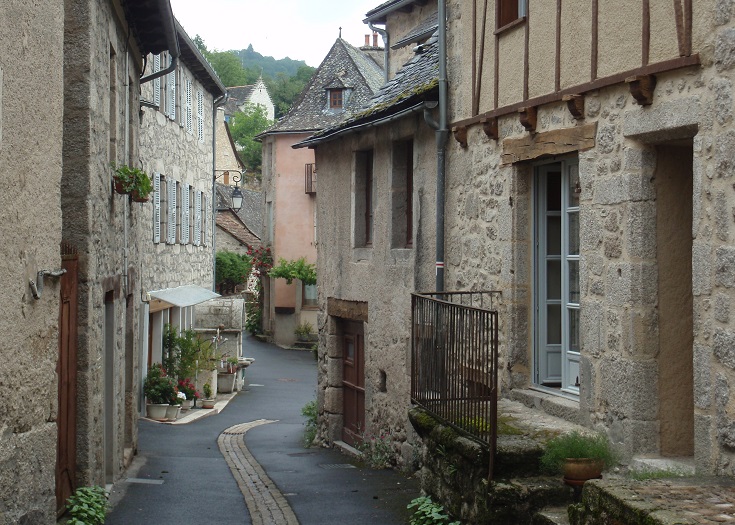
Quaint alley in Espeyrac
Espeyrac
Six days after leaving Aumont-Aubrac, you’ll reach the tiny village of Espeyrac with its narrow, crooked laneways. There’s almost nothing here other than the church, the hotel and a few dozen houses so be sure to take a half hour and explore them all.
Take a closer look around Espeyrac and find a comprehensive list of accommodation and transport options.
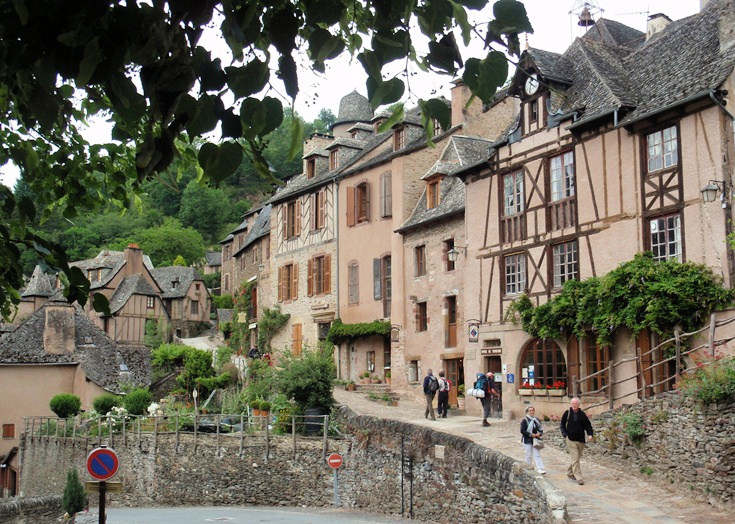
Stone-and-timber houses line a street in Conques
Conques
A short (12.5 km/7.8 mi) walk from Espreyac brings you to the third ‘most beautiful village’ of Conques. Many walkers finish their journey here, and Conques is considered, quite deservedly, one of the highlights of the Chemin de Saint-Jacques du Puy. An astonishingly beautiful jumble of medieval stone-and-timber houses set in a maze of steep cobbled streets, the village is a delight to wander through.
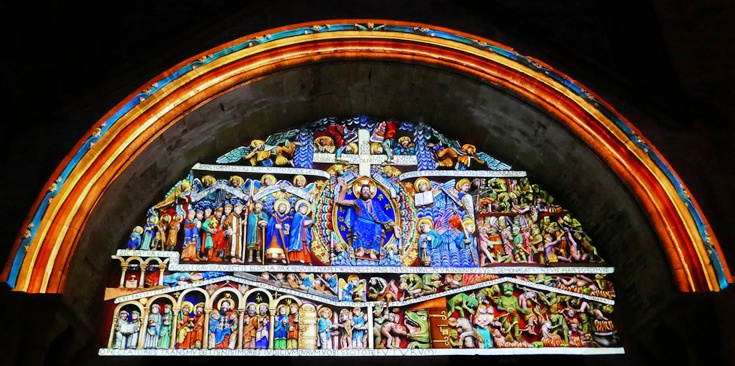
At 10:15 each night, the tympanum above the entrance to church in Conques is lit in jewel colours
Each evening at 08:30 pm, a pilgrims’ blessing is held in the abbey. After the service, everyone gathers outside where a priest tells the story of Sainte-Foy and Saint-Matthew, depicted in the twelfth-century tympanum above the entrance. At 09:30, the rich sounds of the pipe organ fill the abbey and, for a small fee, visitors are able to enjoy the music while wandering the dim corridors of the upper level of the church. At 10:15, it’s time to head outside for the lighting of the tympanum—a slow, magical light display where the intricate carvings are lit in jewel colours.
Take a closer look around Conques and find a comprehensive list of accommodation and transport options.
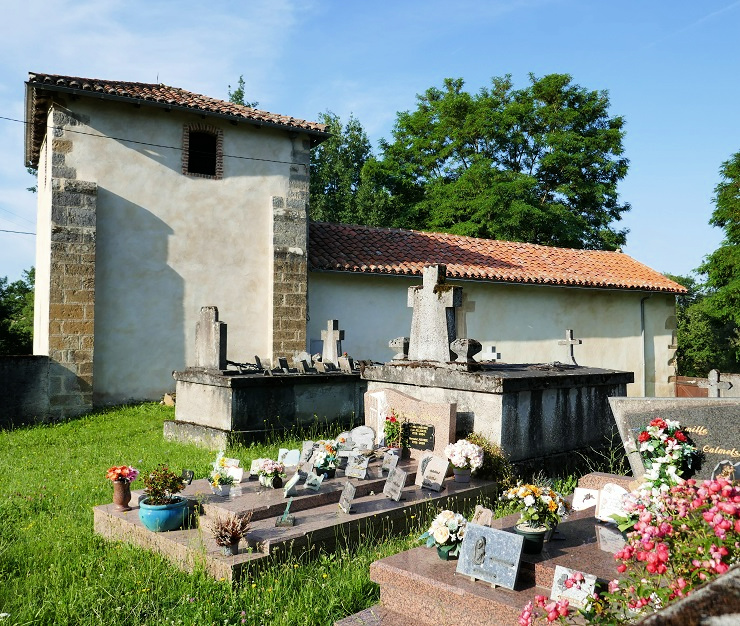
Chapelle Sainte-Madeleine
Chapelle Sainte-Madeleine
As you walk between Lacoste and Terly on the last day of this stage, you’ll pass by a small chapel dedicated to Sainte-Madeleine. The doors are open every day between 10 am and 5 pm. Take a few minutes to step inside where you’ll find the walls and ceiling decorated with beautiful fourteenth-century frescoes depicting Christ with Sainte-Madeleine and the saints John and Matthew.
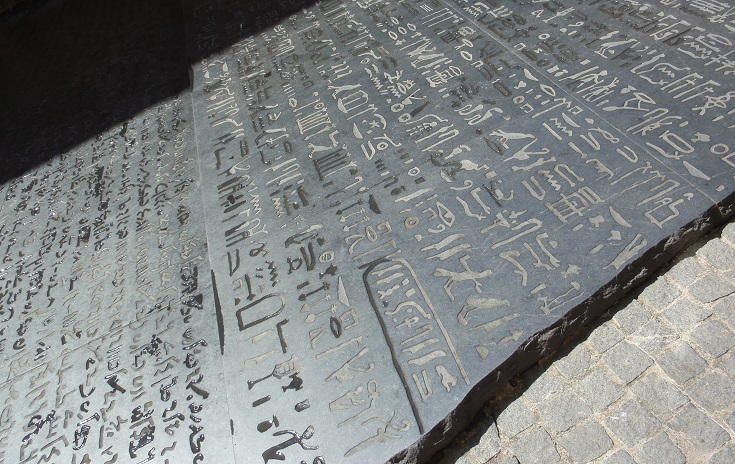
Replica of the Rosetta Stone by artist Joseph Kosuth in Place des Écritures, Figeac
Figeac
This stage of the Chemin de Saint-Jacques du Puy finishes in Figeac, a beautiful town of almost 10,000 people spanning the River Lot. Classified a ville d’art et d’histoire and filled with medieval stone and timbered houses, the backstreets and crooked alleys are a delight to wander through.
Figeac was the birthplace of Jean-François Champollion, the nineteenth-century French scholar who spent more than a decade deciphering the hieroglyphics of the Rosetta Stone. His home is now a museum where you can explore the history of writing.
If you have been walking since Le Puy-en-Velay and have not yet stopped for a rest day, Figeac is the perfect place to take a break. The town boasts a full range of services—dozens of cafés, patisseries, chocolateries as well as the ever-useful banks, doctors, dentists and ATMs!
Take a closer look around Figeac and find a comprehensive list of accommodation.
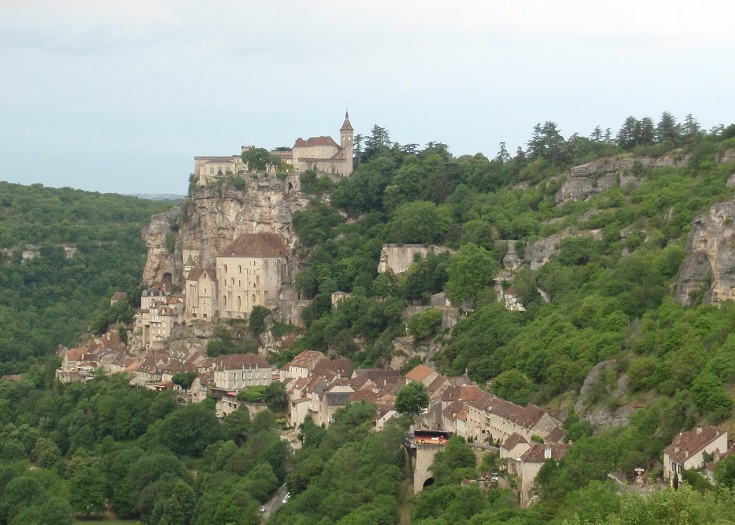
The view of Rocamadour from l’Hôpital
If you have a day or two to spare, you’ll find plenty to do in the area around Figeac. Within an hour’s drive (also accessible by bus or train) is the village of Rocamadour whose ancient buildings cling to the side of the cliff above the River Lot.
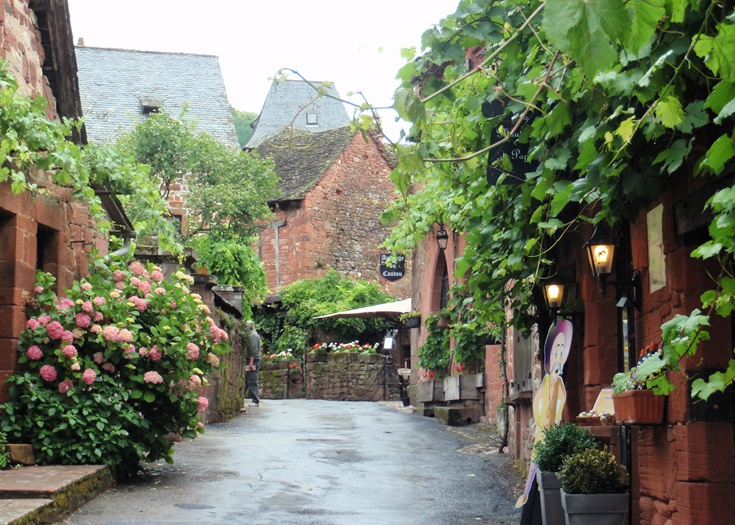
The charming main street of Collonges-la-Rouge
Venture north for a further one-hour drive and stop to explore one of nine of France’s ‘most beautiful villages’. My pick would be Collonges-la-Rouge but you can discover them all between Martel and Rocamadour.
For something completely different, visit the underground lakes and caves, 103 metres below the surface at Gouffre de Padirac.
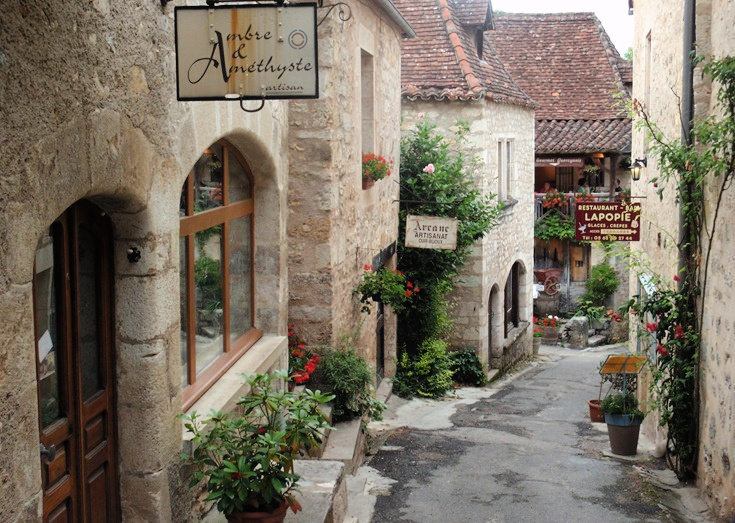
The ‘most beautiful village’ of Saint-Cirq-Lapopie, located on the Célé variante of Stage 3: Figeac to Cahors
From Figeac, continue on to other sections of the Chemin de Saint-Jacques du-Puy
Stage 1: Le Puy-en-Velay to Aumont-Aubrac
Stage 2: Aumont-Aubrac to Figeac
Stage 3: Figeac to Cahors
Stage 4: Cahors to Eauze
Stage 5: Eauze to Saint-Jean-Pied-de-Port
Ready to plan your walk along the Chemin de Saint-Jacques du-Puy?
Purchase the Chemin de Saint-Jacques (PDF) guidebooks
Purchase five guidebooks covering Le Puy-en-Velay to Saint-Jean-Pied-de-Port
Look inside the CHEMIN DE SAINT-JACQUES DU-PUY (PDF) guidebook
